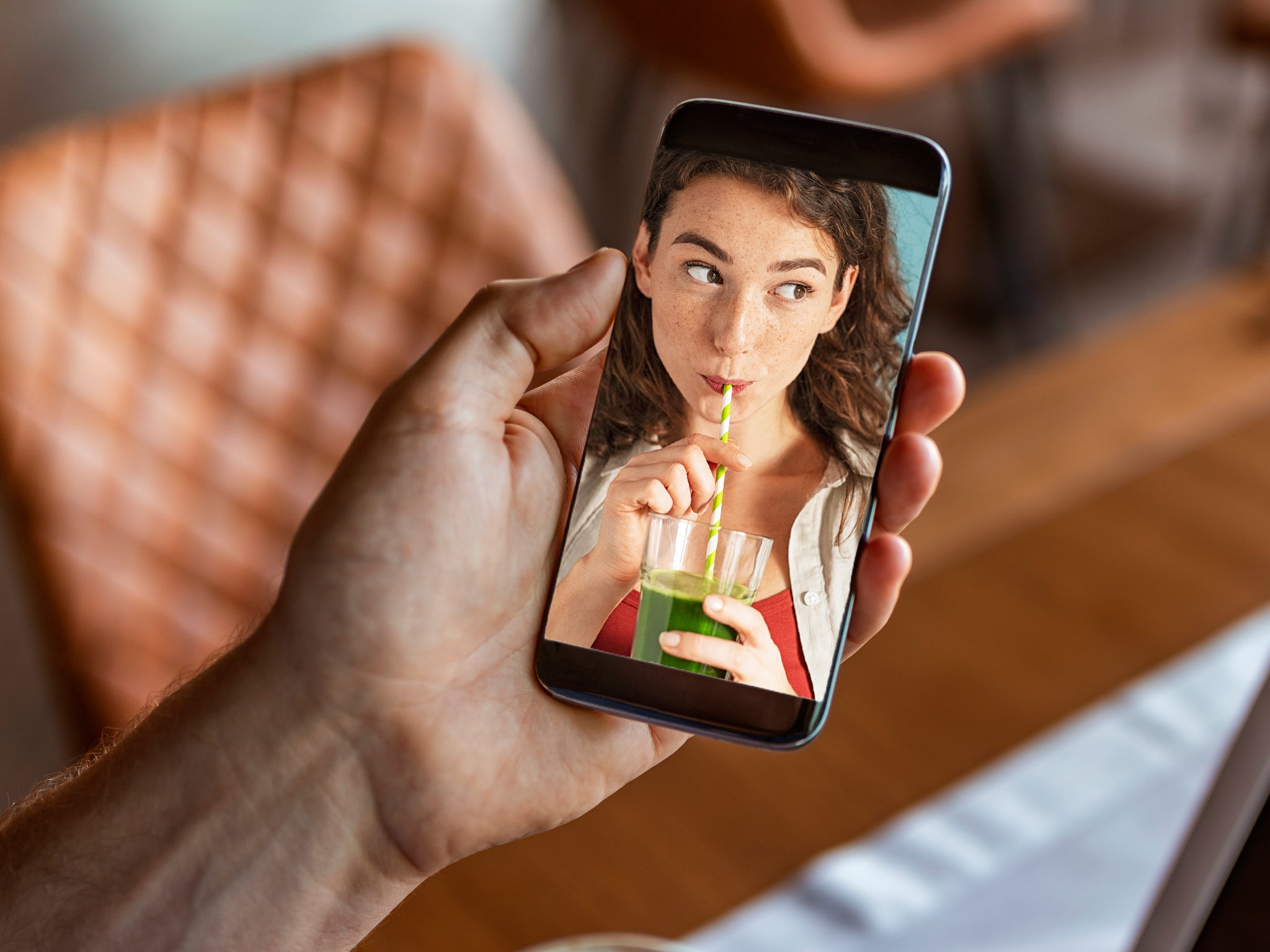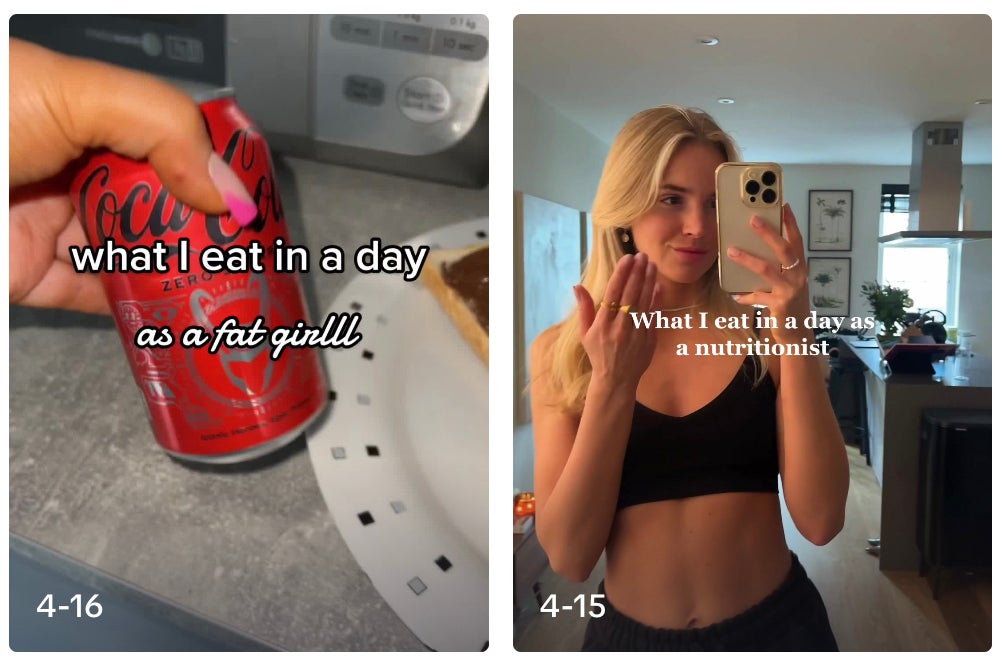I’d waste hours watching ‘What I Eat in a Day’ videos. I can’t believe they’ve made a comeback
Influencers talking about their daily diets have taken over TikTok, calling back to darker days in nascent social media. Olivia Petter, who once watched those videos for diet inspiration, now worries about their effect on younger generations


Your support helps us to tell the story
From reproductive rights to climate change to Big Tech, The Independent is on the ground when the story is developing. Whether it's investigating the financials of Elon Musk's pro-Trump PAC or producing our latest documentary, 'The A Word', which shines a light on the American women fighting for reproductive rights, we know how important it is to parse out the facts from the messaging.
At such a critical moment in US history, we need reporters on the ground. Your donation allows us to keep sending journalists to speak to both sides of the story.
The Independent is trusted by Americans across the entire political spectrum. And unlike many other quality news outlets, we choose not to lock Americans out of our reporting and analysis with paywalls. We believe quality journalism should be available to everyone, paid for by those who can afford it.
Your support makes all the difference.Food has always been the least interesting thing to post on social media. Why would anyone care what you had to eat for breakfast, or what kind of milk you put in your coffee? Is anyone still posting about avocado toast? And does anyone really pay any attention to the minutiae of our lives online?
Well, it turns out that they do. And quite a lot. Introducing “what I eat in a day” videos, a genre of content that occupies one of the busiest corners of the internet. On TikTok, the #whatieatinaday tag has garnered more than 17.6 billion views alone. There are more than 980,000 posts with the tag on Instagram and 222,000 videos on YouTube.
The idea is as simple as it sounds. People post videos detailing their daily dietary habits, spanning from their morning oat milk matcha latte all the way through to their allocated cube of dairy-free, sugar-free chocolate. In case you hadn’t guessed, the overriding tone of these videos is smug. Because why would you share everything you eat in a day if it wasn’t ridiculously healthy? Surely the whole point is to boast about just how “well” you are? And therefore how well your followers could be, too.
I found myself getting sucked into this rabbit hole several years ago. At university, I became obsessed with YouTubers. Think the originals, like Tanya Burr and Zoe Sugg, neither of whom would dare to show us everything they’re eating in a day now. But back then it was par for the course of being an online figure. I’d waste hours poring over their routines, trying to find ways to emulate them in my own life.
This was back in the #CleanEating heyday, when everyone was obsessed with sprinkling chia seeds onto their food, or pretending that spirulina was a palatable thing to ingest. Then there was a major backlash, with doctors speaking up about the dangers of “orthorexia” (a fixation with eating healthily). YouTubers silently stopped sharing their dietary routines. At least for a while.
Hence why I’m so surprised that, in 2023, these sorts of videos are so popular again. On TikTok, they’re often combined with mirror selfies showcasing the user’s body, particularly in the fitness influencer sphere. The idea that it perpetuates, then, is “eat like this and look like me”. Hardly a healthy promotional message to send to young and easily influenced followers who, for all you know, may already have disordered eating habits.
I certainly didn’t have the healthiest approach to food when I was obsessively watching these videos years ago. And watching other people’s uber-healthy (and often plant-based) regimes only exacerbated my obsessions. The portions are often small, the plates meticulously arranged as if for photographing, not eating. Often, the most popular videos in the category are those posted by models and fitness stars, although in recent months there has been a wave of parodies cropping up on TikTok that feature a lot of cheese, pasta and pizza.
These videos are incredibly dull. But they’re also nodding to something darker that can be easy to miss if you’re too busy focusing on just how boring it all is
Nonetheless, how helpful is it to see what someone is eating? Psychologists have spoken out about the potential damage of these videos, with many explaining that they promote diet culture and encourage people to feel self-conscious and anxious about what they eat. Even if the food is deliberately unhealthy, like it is in the parody videos, it’s still not exactly conducive to promoting a balanced diet.
But aside from that, isn’t it all just a little bit dull? That said, apparently dull is the new excitement, and the current raison d’etre of social media. Earlier this week, a widely shared Guardian article pointed out the rise of “beige-fluencers”, or young women whose careers have been built off sharing the most mundane parts of their lives. The piece references people like Love Island star Molly-Mae Hague and influencer Matilda Djerf, both of whom are renowned for sharing every part of their daily routine online. Naturally, what they’re eating plays a pretty instrumental role in that.
But is there something deeper going on here? Yes, ostensibly these videos are incredibly dull. But they’re also nodding to something darker that can be easy to miss if you’re too busy focusing on just how boring it all is. By showing you the ins and outs of what someone is eating, doing and wearing, these videos are promoting a lifestyle. One that probably isn’t accessible to most people by dint of how much money these influencers are making.

Beyond that, when it comes to showing us someone’s body and diet, isn’t that just another way of endorsing shame about the way other people live? Isn’t the whole idea rooted in superiority? These people’s careers are based on selling us an aspirational lifestyle, so the underlying message, surely, is: “This is the ‘right’ way to live, and if you’re doing anything else, you’re living the ‘wrong’ way.” When you consider the fragility of our relationships with food and our bodies, it’s not hard to see how this could be a very slippery slope.
Now, as I near 30, I feel as if I have the self-assurance not to slide into it. My relationship with food is far healthier – it’s just not something I think about very much anymore – and the noise has been turned right down. Nonetheless, this isn’t the case for a lot of other people, some of whom might be discovering this genre of content for the first time. And while I can understand why it might be comforting to engage in the tedium of another person’s day, particularly if you’re having a rather terrible one, my advice is to do so with caution and to remember to take everything you see online with a heavy pinch of salt. Gluten-free or otherwise.



Join our commenting forum
Join thought-provoking conversations, follow other Independent readers and see their replies
Comments